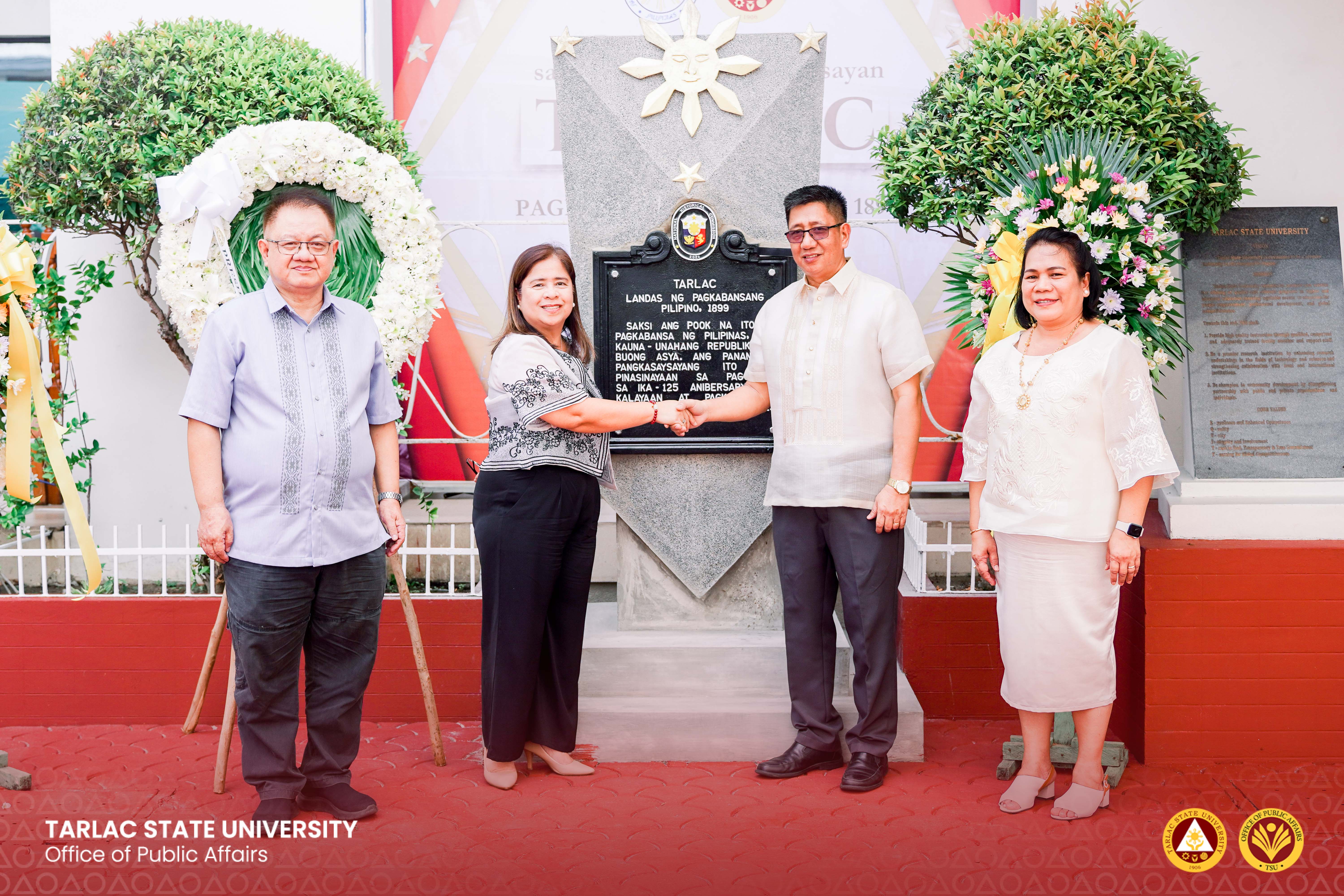National Historical Commission of the Philippines (NHCP) Executive Director Carminda Arevalo led the unveiling of the historical marker in commemoration of the Philippines' 125th independence and nationhood at Tarlac State University's Main Campus on June 21, 2024.
This marker in front of the Administration Building signifies that Tarlac is one of the seven capitals of the first Philippine Republic that helped the country gain independence.
"Napakahalaga ng papel ng TSU sa ating kasaysayan. Tatlo na ang ating NHCP marker at sa buong Central Luzon, ang TSU po ay historical. Ito po ay naging Malacañang ni Aguinaldo noong June 21, 1899. November 12 1899 noong sinakop ng mga Amerikano ang buong Tarlac," Dr. Lino L. Dizon, former NHCP Commissioner and former Center for Tarlaqueño Studies director, said in his speech.
TSU President Dr. Arnold E. Velasco, Vice President for Academic Affairs Dr. Agnes M. Macaraeg, Dir. Arevalo, and Dr. Dizon signed the certificate of transfer and receipt of the 1.8-meter historical marker with a design inspired by a map pin symbol and the Philippine flag.
"Kami po dito sa Tarlac State University ay mapalad na mabigyan ng historical marker. Ito po ay naglalayon na bigyan importansiya ang mga makasaysayang kaganapan at mga lugar na may makasaysayang gawa mula sa pananaw ng mga Pilipino at upang pukawin ang pagmamalaki sa ating pambansang pamana at pagkakakilanlan," Pres. Velasco said in his acceptance speech.
"Nangangako kaming igagalang at protektahan ang historical marker na matatagpuan sa aming institusyon dito sa TSU," he added.
Tarlac served as the last revolutionary capital of President Emilio Aguinaldo. He stayed at the Casa Real de Tarlac, presently the Aguinaldo Hall of the College of Engineering and the site of the Museo-Archivo Tarlaqueño, from June 21 to November 12, 1899.
According to Dr. Dizon, it was in Casa Real de Tarlac where Aguinaldo signed significant decrees, such as the prohibition of merchant vessels flying the American flag from territories held by the Philippine Republic, the organization of the Supreme Court and inferior courts, the promulgation of the General Orders of the Army, and the Fil-Hispano Decree of 30 June 1899 (the basis of the Philippine-Spanish Friendship Decree).
He added that he is "very happy" that a Spanish engineer, Señor Jose Antonio Portillo, who loves the Philippines' history, donated a facsimile of the decree from Spain on the same day to give importance to the 125th anniversary.
"Thanks to Aguinaldo for this decree. This decree is a chain held between the Spaniards and the Filipinos. We need to develop continuously the friendship that Aguinaldo signed on right here; because of that chain hold, we need to continue mixing our blood as I have done," Señor Portillo, Asociacion del Legardo Hispanico en Ultramar (HISPAULT) president, said.
Pres. Velasco signed the deed of donation for the facsimile, which states that it will be exhibited permanently at the university's Museo-Archivo Tarlaqueño.
“Isang kalayaan na ibinigay sa atin upang ating laging pakatatandaan at pakakabigyan ng halaga ang salitang sakripisyo – na sa ating bawat gawin, dapat ang pagsasakripisyong ito ay lagi nating tatandaan. Nagsakripisyo at nagbigay ng buhay ang ating mga bayani. Tayo ngayon ang mga bagong bayani na dapat dito pa lang sa ating unibersidad, kakakitaan na tayo ng pagsasakripisyong iyon upang ating makuha kung ano ba ang pagbabago na gusto natin,” VP Macaraeg said.
The seven capitals consist of Bamban (1899), Tarlac (July 1899), Malolos Cathedral in Malolos Bulacan (September 10, 1898), Cuenca House in Bacoor, Cavite (July 15, 1898), Emilio Aguinaldo Shrine in Kawit Cavite (June 12, 1898), Sideco House in San Isidro, Nueva Ecija (March 1899), and the Cabanatuan Cathedral in Cabanatuan Nueva Ecija (May 1899). (jlmm-OPA)
Photos by Franc Lewis R. Juanatas, Eduardo F. Laxamana Jr., John Benjo H. Bautista, Angilene B. Dableo








